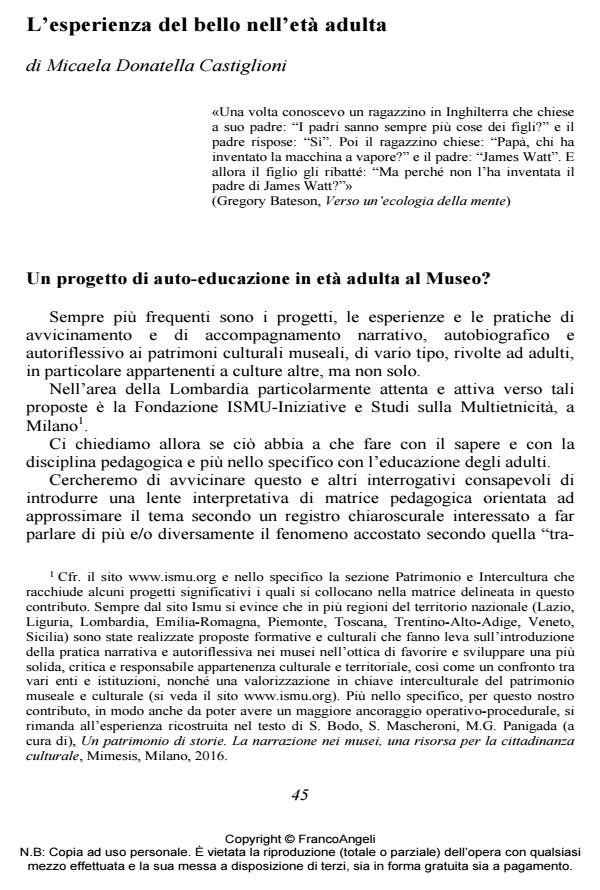L’esperienza del bello nell’età adulta
Journal title EDUCATIONAL REFLECTIVE PRACTICES
Author/s Micaela Donatella Castiglioni
Publishing Year 2016 Issue 2016/1
Language Italian Pages 22 P. 45-66 File size 231 KB
DOI 10.3280/ERP2016-001005
DOI is like a bar code for intellectual property: to have more infomation
click here
Below, you can see the article first page
If you want to buy this article in PDF format, you can do it, following the instructions to buy download credits

FrancoAngeli is member of Publishers International Linking Association, Inc (PILA), a not-for-profit association which run the CrossRef service enabling links to and from online scholarly content.
Is it possible to think of the experience of beauty, or aesthetic experience, as an experience within and through which we may process, construct, revisit and problematize meanings? The objective outcome of beauty would thus take on subjective value with which to confer meaning on, and make sense of, our lives. On these and other conceptual grounds, this paper asks whether educating to beauty in museum settings (with reference to one project in particular) can offer a valid form of adult education when delivered via a cultural, self-learning and self-educational dispositive based on a narrative-autobiographical approach, in which a museum mediator who has been duly trained in self-narrative and self-reflective practices plays a key part in facilitating the learning experience. More specifically, it is proposed that educating adults to beauty may lead them to experience growth, for example by increasing their capacity for wonder or helping them to critically decentre, etc., in the encounter between their own perspective and that of others, including the museum mediator. The actors in this journey-process, that is to say, museum mediators and their interlocutors, who include both Italian and international visitors, enjoy the opportunity to experience both self-care and care for others, where care is defined as a taking on of responsibility. Finally, the author examines the equivalence between educating to beauty-educating to narrative-educating to cultural, critical, active and responsible citizenship: the last-mentioned dimension represents an increasingly urgent priority within the education and training practices targeted at adults in the contemporary era, in which territorial barriers are giving rise to a deep and complex state of crisis that may also contribute to a loss of meaning at both the individual and collective levels. The approach discussed here is situated within a broader educational-pedagogical framework and agenda that is "interioristic" and "introspect¬tive" as well as closely related to the perspective of "narrative pedagogy".
Micaela Donatella Castiglioni, L’esperienza del bello nell’età adulta in "EDUCATIONAL REFLECTIVE PRACTICES" 1/2016, pp 45-66, DOI: 10.3280/ERP2016-001005